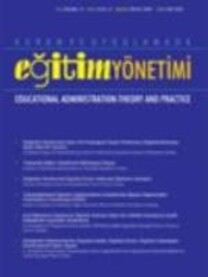The Influence of Women Teachers' Familial Responsibilities on their Self - Actualization
The Influence of Women Teachers' Familial Responsibilities on their Self - Actualization
___
Anthony, C. A., (2014). The lived experiences of veteran elementary urban school teachers: Why and how they stay (Unpublished doctoral dissertation).Western Michigan University, Michigan.Başlevent, C., & Kirmanoğlu, H. (2013). Do preferences for job attributes provide evidence of 'hierarchy of needs'?. Social Indicators Research, 111(2), 549-560.
Boyd, W. A., Thorpe, K. J., & Tayler, C. P. (2010). Preferences of first-time expectant mothers for care of their child: I wouldn't leave them somewhere that made me feel insecure. Australasian Journal of Early Childhood, 35(2), 4-12.
Bragger, J. D., Rodriguez-Srednicki, O., Kutcher, E. J., Indovino, L., & Rosner, E. (2005). Work-family conflict, work-family culture, and organizational citizenship behavior among teachers. Journal of Business and psychology, 20(2), 303-324.
Chang, K. M. (2002). The influences of work-family conflict and sex-role identity on married female teacher's job involvement. International Journal of Human Ecology, 3(1), 95-109.
Coleman, M. (2001). Achievement against the odds: The female secondary head teachers in England and Wales. School Leadership & Management, 21(1), 75-100.
Creswell J. W. (2007). Qualitative inquiry and research design: Choosing among five approaches. Thousand Oaks, CA: Sage.
Creswell, J. W. (2003). Research design: Qualitative, quantitative, and mixed methods approaches. Thousand Oaks, CA: Sage.
Çetinkanat, A. C. (2005). Kendini gerçekleştirme envanteri. Eurasian Journal of Educational Research, 20, 99-112.
Durmuş, E. (2010). "Eğitimde rehberlik hizmetleri." İçinde Deniz, E. ve Erözkan, A. (Ed.), Psikolojik danişma ve rehberlik (ss. 85-113). Ankara: Maya Akademi.
Eckerman, A., C. (1968). A new look at need theory. Training & Development Journal, phallman/hierarchy%20of%20human%20needs/7454553.pdf 18-22. Retrieved from
http://plaza.ufl.edu/
Greenhaus, J. H., & Beutell, N. J. (1985). Sources of conflict between work and family roles. Academy of Management Review, 10(1), 76-88.
Greene, L., & Burke, G. (2007). Beyond self-actualization. Journal of Health and Human Services Administration, 30(2), 116-128. Retrieved from https://digital.library.txstate.edu /bitstream/handle/10877/4089/fulltext.pdf
Ivtzan, I., Gardner, H. E., Bernard, I., Sekhon, M., & Hart, R. (2013). Wellbeing through self-fulfilment: Examining developmental aspects of self-actualization. The Humanistic Psychologist, 41(2), 119-132.
Jansen, N. W., Kant, I., Kristensen, T. S., & Nijhuis, F. J. (2003). Antecedents and consequences of work-family conflict: A prospective cohort study. Journal of Occupational and Environmental Medicine, 45(5), 479-491.
Koltko-Rivera, M. E. (2006). Rediscovering the later version of Maslow's hierarchy of needs: Self-transcendence and opportunities for theory, research, and unification. Review of General Psychology, 10(4), 302-317.
Lundberg, U., Mårdberg, B., & Frankenhaeuser, M. (1994). The total workload of male and female white collar workers as related to age, occupational level, and number of children. Scandinavian Journal of Psychology, 35(4), 315-327.
Maslow, A. H. (1943). A theory of human motivation. Psychological Review, 50 (4), 370-396. Retrieved from http://psychclassics.yorku.ca/ Maslow/motivation.htm
Maslow, A. H. (1964). Religions, values, and peak-experiences. Columbus: The Ohio State University Press. Retrieved from http://www.druglibrary.org/schaffer/lsd/maslow6.htm
Maslow, A. (1965). Self-actualization and beyond. Retrieved from http://files.eric.ed.gov /fulltext/ED012056.pdf
Maslow, A. H. (1971). The farther reaches of human nature. New York: Viking Press. Retrieved from http://www.humanpotentialcenter.org/Articles/FartherReaches.pdf
Maslow, A. H. (1974a). Creativity in self-actualizing people. In Covin, T.M. (Ed.), Readings in human development: A humanistic approach (pp.107-117). New York: MSS Information Corporation.
Maslow, A. H. (1974b). The good life of the self-actualizing person. In Covin, T.M. (Ed.), Readings in human development: A humanistic approach (pp.46-53). New York: MSS Information Corporation.
Mayrhofer, W., Meyer, M., Schiffinger, M., & Schmidt, A. (2008). The influence of family responsibilities, career fields and gender on career success: An empirical study. Journal of Managerial Psychology, 23(3), 292-323.
Mulawarman, W. G. (2015). Female teachers holding the position of principal (case study of females in pursuing career in school). American Journal of Educational Research, 3(3), 282-287.
Michailidis, M. P., Morphitou, R. N., & Theophylatou, I. (2012). Women at work equality versus inequality: Barriers for advancing in the workplace. The International Journal of Human Resource Management, 23(20), 4231-4245.
Neher, A. (1991). Maslow's theory of motivation: A critique. Journal of Humanistic Psychology, 31(3), 89-112.
Reiss, S., & Havercamp, S. M. (2005). Motivation in a developmental context: A new method for studying self-actualization. Journal of Humanistic Psychology, 45, 41-53.
Sardoğan, E. M., Özkamalı, E., ve Dicle, N. A. (2006). Öğretmen adaylarında demokratik tutum, nevrotik eğilimler ve kendini gerçekleştirme. Hacettepe Üniversitesi Eğitim Fakültesi Dergisi, 30(30), 149-158.
Shalom-Tuchin, B. (2013). Combining multiple roles among high position women in Israel, as seen by the woman, her husband and a child. Journal of International Women's Studies, 14(1), 69-93.
Sungur, P., ve Yüksek, S. (2009). Beden eğitimi ve spor öğretmenliği son sınıf öğrencilerinin benlik tasarımı ve kendini gerçekleştirme düzeylerinin incelenerek cinsiyetler arasındaki farkların betimlenmesi. Beden Eğitimi ve Spor Bilimleri Dergisi, 3(3), 190-195.
Zalenski, R. J., & Raspa, R. (2006). Maslow's hierarchy of needs: A framework for achieving human potential in hospice. Journal of Palliative Medicine, 9(5), 1120-1127.
* Bu makale "23. Eğitim Bilimleri Kurultayı"nda sunulan sözlü bildirinin genişletilmiş halidir.
- ISSN: 1300-4832
- Yayın Aralığı: 4
- Başlangıç: 1995
- Yayıncı: Pegem Akademi Yayıncılık Eğitim Danışmanlık Hizmetleri Tic. Ltd. Şti.
The Influence of Women Teachers' Familial Responsibilities on their Self - Actualization
Politik Beceri Envanterinin Eğitim Örgütlerinde Geçerlik ve Güvenirlik Çalışmaları
MURAT ÖZDEMİR, Safiye Çiğdem GÖREN
SERKAN DİNÇER, MELİS YEŞİLPINAR UYAR
İlk Defa ve Yeniden Okul Müdürü Görevlendirilmesi: Sözlü Sınav Üzerine Bir Değerlendirme
KEMAL KAYIKÇI, İzzet ÖZDEMİR, GÜLNAR ÖZYILDIRIM
Öğretmen Adaylarının Okul Yaşam Kalitesi ve Okula Yabancılaşma Algıları Arasındaki İlişki
AHMET AYIK, ÖZNUR ATAŞ AKDEMİR
The Influence of Women Teachers' Familial Responsibilities on theirSelf - Actualization
